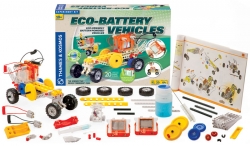
Enlarge

Enlarge
Eco-Battery Vehicles
Order code: 620615
| Purchase QTY: (Each) | 1+ | |||||
|---|---|---|---|---|---|---|
| Base price | $83.00 | |||||
| Scientrific's price | $67.00 |
The Future of Electric Cars
It's looking increasingly inevitable that electric vehicles (EV's for short) will be the cars of the future. More specifically, battery electric vehicles (or BEV's) — which are powered entirely by rechargeable chemical cells — are starting to become practical. Many major auto manufacturers have BEV's in development and a few already have BEV's on the road today. The challenge in making BEV's a viable transportation solution is the battery. Batteries must be easy to recharge, able to hold enough charge to drive long distances and more efficient than petrol engines. Scientists and engineers around the world are tackling this battery challenge and major progress is being made.
In this kit you can build and experiment with a new type of environmentally friendly battery ("fuel cell") to learn about electrochemical cells and BEV's. The battery is a metal-air electrochemical cell, a type of battery that is widely used in small scale devices. It is ideal for demonstrating battery technology because it does not use any harmful chemicals. Instead it uses only magnesium plates, salt water and the oxygen in the air to generate electricity. Moreover, magnesium is considered an eco-friendly renewable fuel because it could be harvested cleanly from ocean water.
Build 20 different models and power them with this special battery. Experiment with different concentrations of salt to see how long your battery can run. Learn about electrochemistry and battery technology.
One metal plate lasts as long as a regular AA battery (six plates included).
This kit includes:
a full-colour 64 page experiment manual and 91 building pieces.
For ages 10 and up.
For more great Science Kits: View >>>>
Last edited 26th Oct 2022
 This product is used in teaching these Australian Curriculum codes:
This product is used in teaching these Australian Curriculum codes:
ACSSU095 - Chemical Sciences - Chemical Changes - Changes to materials can be reversible, such as melting, freezing, evaporating; or irreversible, such as burning and rusting
ACSSU097 - Physical Sciences - Electrical Circuits - Electrical energy can be transferred and transformed in electrical circuits and can be generated from a range of sources
Click a curriculum code to see other products that relate.
Documents: Catalogue | Scientrific April 2025 Mini Catalogue | Catalogue | Vernier 2025 K-12 Catalogue | Catalogue | Vernier 2025 University Catalogue | Manual Sample | Eco-Battery Vehicles | | |||||||||
Note: Prices do NOT include GST or freight


